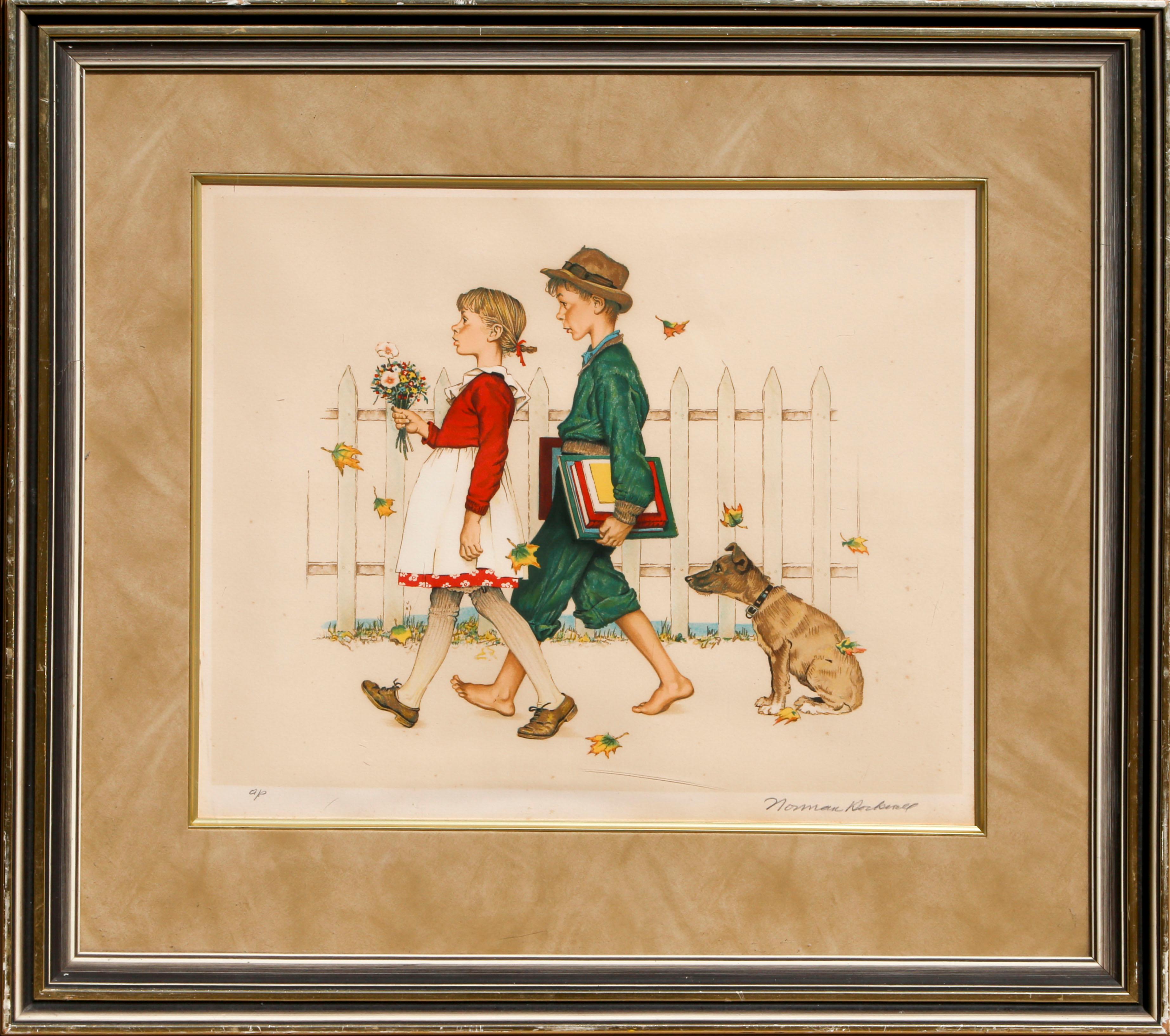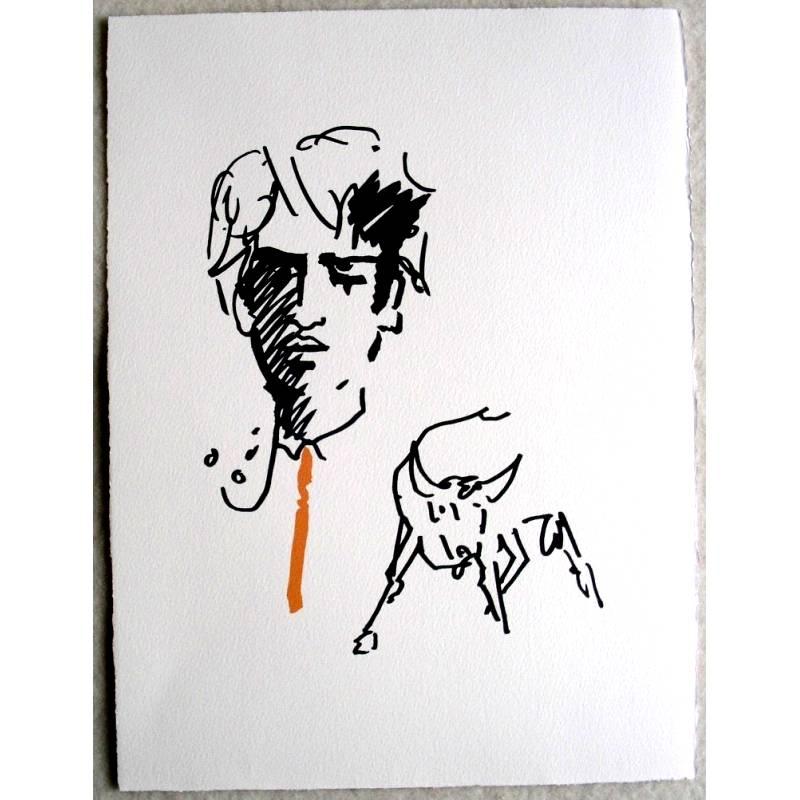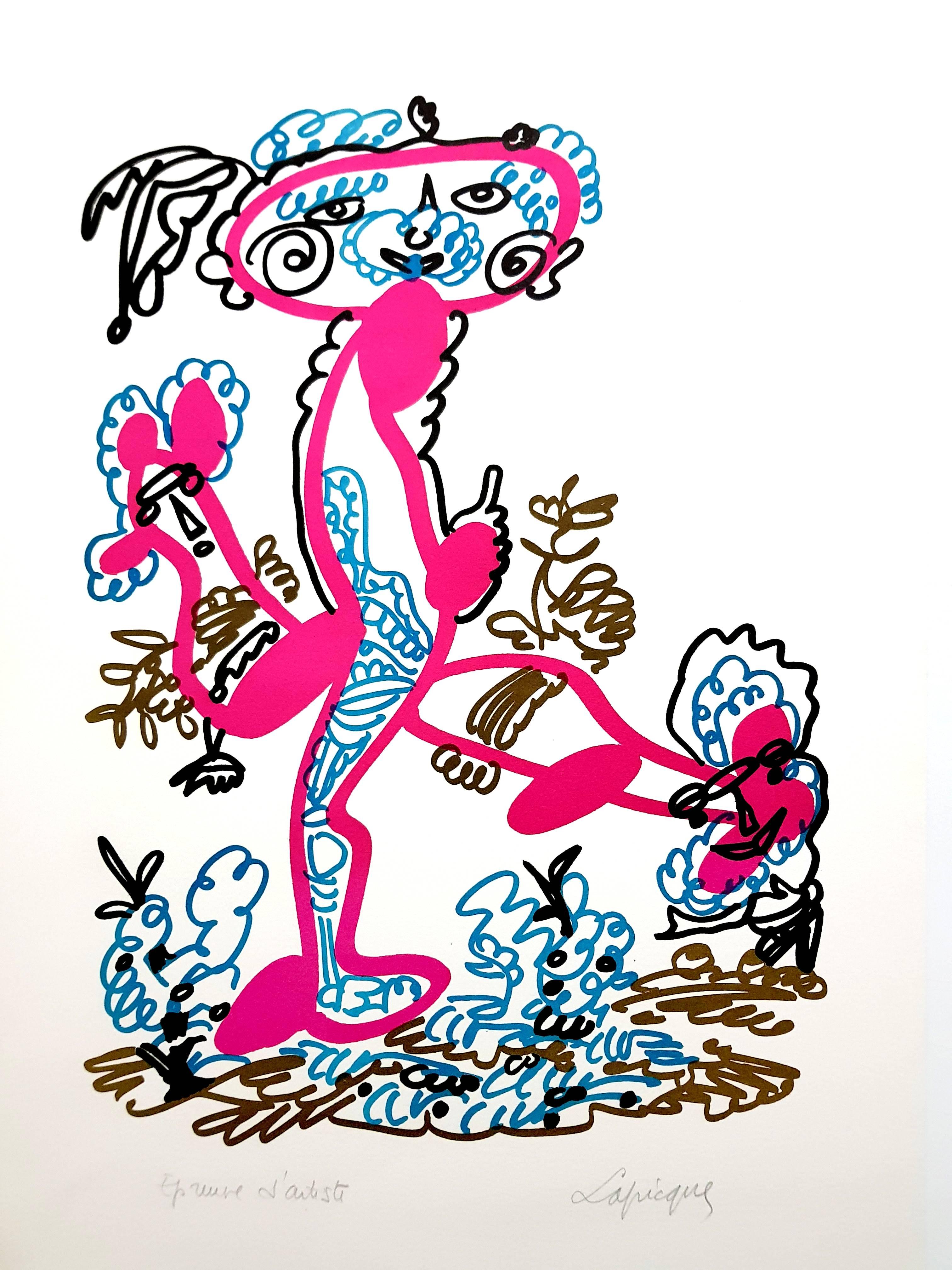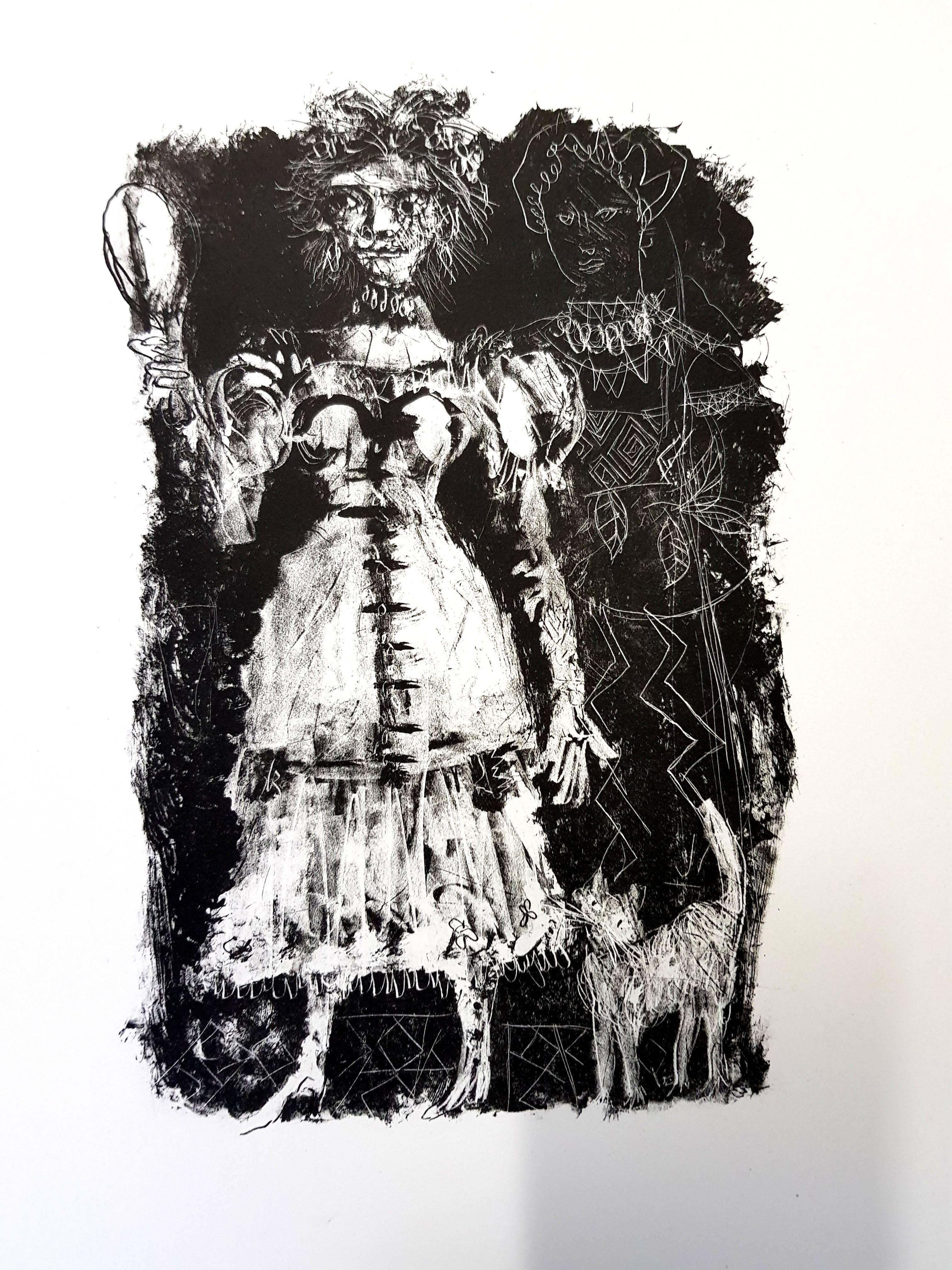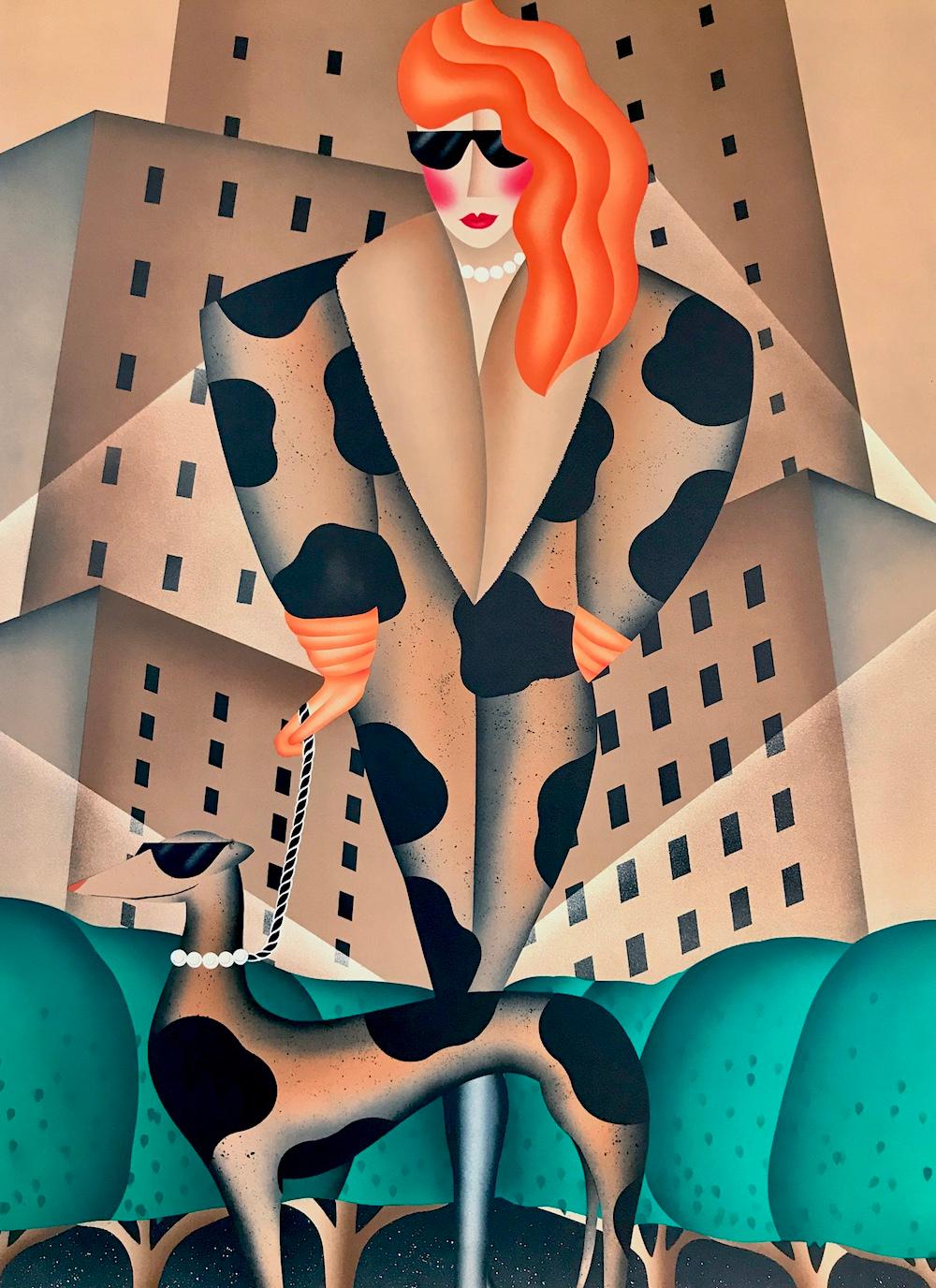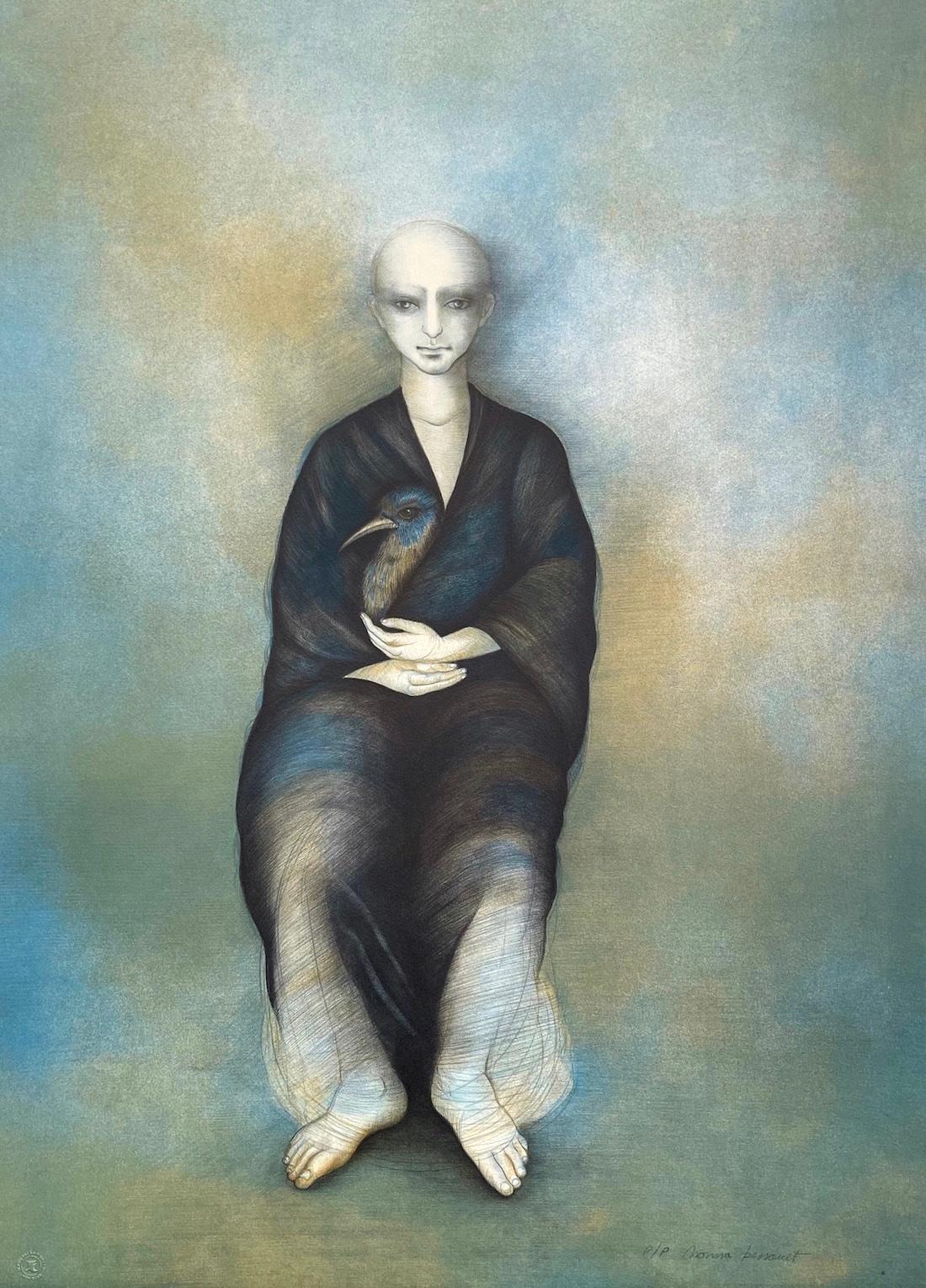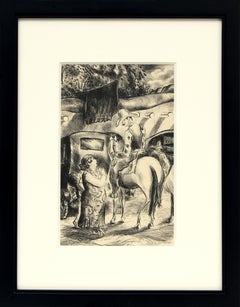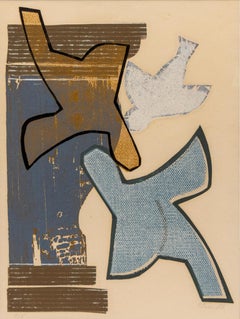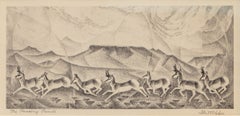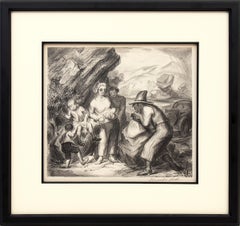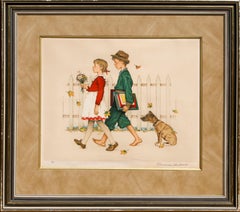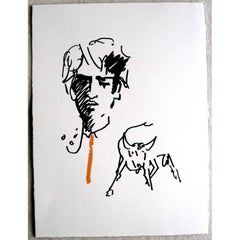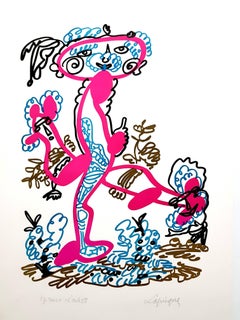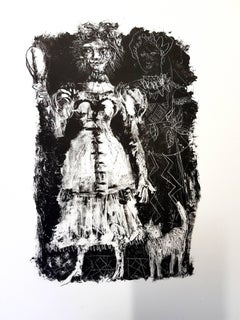Items Similar to Riding the Brahmas (Man Riding a Bull) - Signed Original 20th Century Lithograph
Want more images or videos?
Request additional images or videos from the seller
1 of 11
Ethel MagafanRiding the Brahmas (Man Riding a Bull) - Signed Original 20th Century Lithograph
About the Item
This original modernist lithograph, titled Riding the Brahmas, is a dynamic work by esteemed Colorado artist Ethel Magafan. The lithograph depicts a dramatic scene of a man riding a bull while his companion shields himself from the animal's powerful hooves. The intense action and bold composition capture the spirit of rodeo and Western life, showcasing Magafan’s unique style and mastery of the medium. Signed, titled, and numbered by the artist in the lower margin of the print.
Ethel Magafan was known for her contributions to modernist art, and this piece is a stunning example of her ability to capture movement, emotion, and Western imagery. The lithograph is presented in a custom frame, ensuring both aesthetic appeal and protection for long-term preservation.
Provenance: Private collection, Colorado
This original lithograph by Ethel Magafan is an exceptional addition to any collection of 20th-century Western art, modernist prints, or works by notable Colorado artists.
- Creator:Ethel Magafan (1916-1993, American)
- Dimensions:Height: 20.75 in (52.71 cm)Width: 18.5 in (46.99 cm)Depth: 1 in (2.54 cm)
- Medium:
- Movement & Style:
- Period:
- Framing:Frame IncludedFraming Options Available
- Condition:Very good vintage condition. Detailed condition report available upon request.
- Gallery Location:Denver, CO
- Reference Number:Seller: 283861stDibs: LU27315565992
Ethel Magafan
Ethel Magafan Born Illinois, 1916
Died New York, 1993 Jenne and Ethel Magafan were identical twins, born in Chicago to a Greek immigrant father and a Polish mother. Due to health concerns about their father, the family moved to Colorado, living first in Colorado Springs and then in Denver. He was a proud supporter of their artistic ambitions but died suddenly 1932, a heavy blow to both of them. They attended East High School in Denver, where they found a mentor in their art teacher Helen Perry. She had studied at the Art Institute of Chicago but had later abandoned a career as an artist, making her all the more determined to help the Magafan twins succeed artistically. While still in high school, the twins impressed artist Frank Mechau, and Helen Perry paid for their lessons with him. He subsequently invited them to apprentice with him at his Redstone studio. In 1936, Jenne won the Carter Memorial Art Scholarship and shared it with her sister so that they both could attend the Broadmoor Art Academy in Colorado Springs. Once they ran out of money, Mechau, now teaching there, hired them as assistants. Through their involvement at the Academy, the twins entered into careers as muralists, working at first with Mechau and then with Peppino Mangravite. From 1937 to 1943, Ethel was commissioned to paint her first of seven government sponsored murals. Located in the US Post Office in Auburn, Nebraska, this commission made Ethel (at age 26) the youngest artist in America to receive such an honor. Denver Art Museum director Donald J. Bear once commented that “[Ethel and Jenne's] study of local detail makes them appear as little Bruegels of ranch genre – natural and unforced.” As mural painting commissions diminished, Ethel began to do more easel painting for which she used a palette knife and tempera paints to great effect. After settling in California for five years, the twins permanently relocated to Woodstock, New York in 1945, where the sisters lived apart for the first time. Ethel developed an increasing focus within her work, particularly for horses and abstract landscapes. She met fellow artist Bruce Currie at an artist’s party, and the two were married in 1946. The twins and their husbands went to Greece and Italy for a year when Jenne’s husband and Ethel were granted Fulbright Scholarships. Upon their return, Jenne died suddenly of a cerebral hemorrhage — a loss that Ethel would mourn deeply. With her sister gone, her landscapes became much more abstract, as she sought out the feeling of the scene rather than an exact representation. During the mid-fifties, she began to make annual trips to Colorado. Her stature within the art world was solidified in 1971 when the United States ©David Cook Galleries, LLC
About the Seller
5.0
Gold Seller
Premium sellers maintaining a 4.3+ rating and 24-hour response times
Established in 1979
1stDibs seller since 2013
286 sales on 1stDibs
Typical response time: 1 hour
- ShippingRetrieving quote...Shipping from: Denver, CO
- Return Policy
Authenticity Guarantee
In the unlikely event there’s an issue with an item’s authenticity, contact us within 1 year for a full refund. DetailsMoney-Back Guarantee
If your item is not as described, is damaged in transit, or does not arrive, contact us within 7 days for a full refund. Details24-Hour Cancellation
You have a 24-hour grace period in which to reconsider your purchase, with no questions asked.Vetted Professional Sellers
Our world-class sellers must adhere to strict standards for service and quality, maintaining the integrity of our listings.Price-Match Guarantee
If you find that a seller listed the same item for a lower price elsewhere, we’ll match it.Trusted Global Delivery
Our best-in-class carrier network provides specialized shipping options worldwide, including custom delivery.More From This Seller
View AllCowboy on Horseback with Tourists, 1930s American Scene Regional Art Print
By Caroline Speare Rohland
Located in Denver, CO
"Cowboy on Horseback with Tourists" is a fine art lithograph created circa 1935 by American artist Caroline Speare Rohland. This evocative Regionalist print captures a distinctly Ame...
Category
Mid-20th Century American Modern Figurative Prints
Materials
Lithograph
Original Signed 1970s Blue Birds Colored Lithograph - Mid Century Modern Artwork
Located in Denver, CO
This vintage original lithograph by renowned artist Mary Chenoweth features an abstract depiction of birds in flight, showcasing her unique technique of layering various textures of ...
Category
1970s American Modern Animal Prints
Materials
Lithograph
The Passing Parade, 20th Century Lithograph, Southwestern Desert with Antelope
By Ila Mae McAfee
Located in Denver, CO
This stunning original lithograph, titled The Passing Parade, is a signed piece by renowned American artist Ila Mae McAfee (1897-1995). Created in the 20th century, the artwork depic...
Category
20th Century American Modern Animal Prints
Materials
Lithograph
1930s Lithograph Print of Tourists at Garden of the Gods, Colorado Springs, CO
By Charles Locke
Located in Denver, CO
"Photo Opportunity" is a stunning 1930s lithograph by Charles Wheeler Locke (1899-1983), showcasing a group of tourists amidst the breathtaking red roc...
Category
1930s American Modern Figurative Prints
Materials
Paper, Lithograph
Card Players (16/100), 1959 Framed Figurative Lithograph Print, Interior Scene
By Kenneth Miller Adams
Located in Denver, CO
This lithograph titled Card Players 16/100, created by renowned artist Kenneth Miller Adams (1897-1966) around 1959, captures a lively interior scene of several male figures engrossed in a card game. The print is an exceptional example of Adams' figurative work, showcasing his skill in portraying dynamic social moments. The lithograph is presented in a sleek black frame with archival materials, and the outer dimensions of the framed piece are 25 ⅝ x 31 ¼ x 1 ⅛ inches. The image sight size is 18 ½ x 24 ¼ inches.
This piece remains in excellent condition, clean, and well-preserved. Please contact us for a detailed condition report.
Provenance: Private Collection, Denver, Colorado
Expedited and international shipping is available—please reach out for a quote.
About the Artist:
Kenneth Miller Adams, born in Kansas in 1897, began his art career in Topeka in 1913, studying under artist G.M. Stone. He later continued his education at the Art Institute of Chicago before serving in World War I. After his service, Adams studied at the Art Students League in New York City and then traveled abroad to immerse himself in Italian and French art.
In 1924, Adams returned to Kansas, where his friend Andrew Dasburg encouraged him to move to Taos, New Mexico. There, Adams became the youngest and final member of the Taos Society...
Category
1950s American Modern Portrait Prints
Materials
Lithograph
Corralled Horse (Artists Proof), 1940s Framed American Modernist Horse Etching
By Ethel Magafan
Located in Denver, CO
"Corralled Horse", is an etching on paper by western artist Ethel Magafan (1916-1993) of a single dark horse standing outside in a wooden fenced corral. Presented in a custom frame, outer dimensions measure 19 x 23 inches. Image size is 10 x 14 inches. This is marked as an Artist Proof
Piece is in very good condition - please contact us for a detailed condition report.
Provenance: Estate of Artist, Ethel Magafan
Expedited and international shipping is available - please contact us for a quote.
About the Artist:
Ethel Magafan
Born 1916
Died 1993
The daughter of a Greek immigrant father and a Polish immigrant mother who met and married in Chicago, Ethel Magafan, her identical twin sister Jenne and their elder sister Sophie grew up in Colorado to which their father relocated the family in 1919. They initially lived in Colorado Springs where he worked as a waiter at the Antlers Hotel before moving to Denver in 1930 to be head waiter at the Albany Hotel. Two years later during the Great Depression Ethel and Jenne experienced at sixteen the tragic loss of their father who had encouraged their artistic aspirations.
He was proud when Ethel, a student at Morey Junior High School, won top prizes in student poster contests sponsored by the Denver Chamber of Commerce and the Denver Post. At East High School in Denver she and Jenne contributed their art talents to the school’s and by their senior year were co-art editors of the Angelus, the 1933 yearbook. At East they studied art with Helen Perry, herself a student of André Lhote in Paris and the Art Institute of Chicago. Her decision to abandon an arts career to teach high school students served as an important example to Ethel and Jenne, who early on had decided to become artists. In a city-wide Denver competition for high school art students Ethel won an eighteenweek art course in 1932-33 to study at the Kirkland School of Art which artist Vance Kirkland had recently established in the Mile High City.
Perry encouraged the Magafan twins’ talent, exposing them to the work of Matisse, Picasso and Cézanne and introducing them to local artists and architects like Frank Mechau and Jacques Benedict whom she invited to speak in her high school art classes. She paid the modest tuition for Ethel and Jenne to study composition, color, mural designing and painting at Mechau’s School of Art in downtown Denver in 1933-34. In the summer of 1934 and for a time in 1936 they apprenticed with him at his studio in Redstone, Colorado.
When they returned to Denver in 1934 with no family breadwinner to support them, their mother insisted that they have real jobs so they worked as fashion artists in a Denver department store. When Jenne won the Carter Memorial Art Scholarship ($90.00) two years later, she shared it with Ethel so that both of them could enroll in the Broadmoor Art Academy (now the Colorado Springs Fine Arts Center) where they studied with Mechau. When the scholarship money ran out after two months, he hired them as his assistants. Along with Edward (Eduardo) Chavez and Polly Duncan, they helped him with his federal government mural commissions. At the Fine Arts Center Ethel also studied with Boardman Robinson and Peppino Mangravite, who hired her and Jenne in 1939 to assist him in his New York studio with two murals commissioned for the post office in Atlantic City, New Jersey. Like their Denver high school art teacher, Robinson also stressed the need to draw from nature in order to "feel" the mountains, which later become the dominant subject matter of Ethel’s mature work after World War II.
Mechau trained her and her sister in the complex process of mural painting while they studied at the Colorado Springs Fine Arts Center, teaching them the compositional techniques of the European Renaissance masters. This also involved library research for historical accuracy, small scale drawing, and Page 2 of 4 the hand-making of paints and other supplies. Ethel recalled that their teacher "was a lovely man but he was a hard worker. He drove us. There was no fooling around."
Her apprenticeship with Mechau prepared her to win four national government competitions, beginning at age twenty-two, for large murals in U.S. post offices: Threshing – Auburn, Nebraska (1938), Cotton Pickers – Wynne, Arkansas (1940), Prairie Fire – Madill, Oklahoma (1940), and The Horse Corral – South Denver, Colorado (1942). In preparation for their commissions Ethel and her sister made trips around the country to pending mural locations, driving their beat-up station wagon, dressed in jeans and cowboy boots with art supplies and dogs in tow. She and Jenne combined their talents in the mural, Mountains in Snow, for the Department of Health and Human Services Building in Washington, DC (1942). A year later Ethel executed her own mural, Andrew Jackson at the Battle of New Orleans, January 8, 1814, for the Recorder of Deeds Building, also in Washington, DC. Her first mural commission, Indian Dance, done in 1937 under the Treasury Department Art Project for the Senate Chamber in the United States Capitol, has since disappeared.
Ethel and her sister lived and worked in Colorado Springs until 1941 when their residence became determined by the wartime military postings of Jenne’s husband, Edward Chavez. They moved briefly to Los Angeles (1941-42) and then to Cheyenne, Wyoming, while he was stationed at Fort Warren, and then back to Los Angeles for two years in 1943. While in California, Ethel and Jenne executed a floral mural for the Sun Room of the Beverly Hills Hotel and also painted scenes of the ocean which they exhibited at the Raymond and Raymond Galleries in Beverly Hills. While in Los Angeles they met novelist Irving Stone, author of Lust for Life, who told them about Woodstock, as did artists Arnold Blanch and Doris Lee (both of whom previously taught at the Colorado Springs Fine Arts Center school. In summer of 1945 Ethel, her sister and brother-in-law drove their station wagon across the country to Woodstock which became their permanent home.
A year later Ethel married artist and musician, Bruce Currie, whom she met in Woodstock. In 1948 with the help of the GI Bill they purchased an old barn there that also housed their individual studios located at opposite ends of the house. The spatial arrangement mirrors the advice she gave her daughter, Jenne, also an artist: "Make sure you end up with a man who respects your work…The worst thing for an artist is to be in competition with her husband."
In 1951 Ethel won a Fulbright Scholarship to Greece where she and her husband spent 1951-52. In addition to extensively traveling, sketching and painting the local landscape, she reconnected with her late father’s family in the area of Messinia on the Peloponnese peninsula in southern Greece. At the same time, her sister Jenne accompanied Chavez on his Fulbright Scholarship to Italy where they spent a productive year painting and visiting museums. Shortly after returning home, Jenne’s career was cut tragically short when she died of a cerebral hemorrhage at age thirty-six. It deeply affected Ethel whose own work took on a somber quality for several years conveyed by a darkish palette, as seen in her tempera painting, Aftermath (circa 1952).
In the 1940s Ethel and her sister successfully made the important transition from government patronage to careers as independent artists. Ethel became distinguished for her modernist landscapes. Even though Ethel became a permanent Woodstock resident after World War II, from her childhood in Colorado she retained her love of the Rocky Mountains, her "earliest source of my lifelong passion for mountain landscape." She and her husband began returning to Colorado for annual summer camping trips on which they later were joined by their daughter, Jenne.
Ethel did many sketches and drawings of places she found which had special meaning for her. They enabled her to recall their vital qualities which she later painted in her Woodstock studio, conveying her feeling about places remembered. She also produced a number of watercolors and prints of the Colorado landscape that constituted a departure from the American Scene style of her earlier paintings. Her postwar creative output collectively belongs to the category of landscape abstractionists as described by author Sheldon Cheney, although to a greater or lesser degree her work references Colorado’s mountainous terrain. She introduced a palette of stronger pastels in her paintings such as two temperas, Evening Mountains from the 1950s and Springtime in the Mountains from the early 1960s.
In 1968 she was elected an Academician by the National Academy of Design in New York. Two years later, based on results of her many summer trips to Colorado, the U.S. Department of the Interior invited her to make on-the-spot sketches of the western United States, helping to document the water resources development and conservation efforts by the Department of the Interior. Her sketches were exhibited at the National Gallery in Washington, DC, and then sent on a national tour by the Smithsonian Institution. Similarly, her previous work as a muralist earned her a final commission at age sixty-three for a 12 by 20 foot Civil War image, Grant in the Wilderness, installed in 1979 in the Chancellorsville Visitors Center at the Fredericksburg National Military Park in Virginia. In the 1970s, too, she taught as Artist-in-Residence at Syracuse University and at the University of Georgia in Athens.
Her many awards include, among others, the Stacey Scholarship (1947); Tiffany Fellowship (1949); Fulbright Grant (1951-52, in Greece with her husband); Tiffany Fellowship (1949); Benjamin Altman Landscape Prize, National Academy of Design (1955); Medal of Honor, Audubon, Artists (1962); Henry Ward Granger Fund Purchase Award, National Academy of Design (1964); Childe Hassam Fund Purchase Award, American Academy of Arts and Letters (1970); Silver Medal, Audubon Artists (1983); Champion International Corporation Award, Silvermine Guild, New Canaan, Connecticut (1984); John Taylor Award, Woodstock Artists Association, Woodstock, New York (1985); Harrison Cady...
Category
1940s American Modern Figurative Prints
Materials
Paper, Etching
You May Also Like
Young Love Walking to School, Signed Lithograph by Norman Rockwell
By Norman Rockwell
Located in Long Island City, NY
Young Love Walking to School
Norman Rockwell
American (1894–1978)
Date: ca 1970
Lithograph on paper, signed and numbered in pencil
Edition of AP
Size: 16 x 20 in. (40.64 x 50.8 cm)...
Category
1970s American Modern Portrait Prints
Materials
Lithograph
Jean Cocteau - The Elegant Toreador - Original Lithograph
By Jean Cocteau
Located in Collonge Bellerive, Geneve, CH
Original Lithograph by Jean Cocteau
Title: The Elegant Toreador
1961
Dimensions: 28 x 38 cm
Lithograph made for the portfolio "Gitans et Corridas" published by Société de D...
Category
1960s Modern Animal Prints
Materials
Lithograph
$742 Sale Price
20% Off
Charles Lapicque (after) - Homage to Dufy - Lithograph
By Charles Lapicque
Located in Collonge Bellerive, Geneve, CH
Charles Lapicque
Original Handsigned Lithograph
Dimensions: 56 x 38 cm
Edition: Epreuve d'Artiste
Hand Signed
Charles Lapicque was one of the great painters of the “Ecole de Paris...
Category
1960s Modern Animal Prints
Materials
Lithograph
Antoni Clavé - Original Lithograph - For Pushkin's Queen of Spades
By Antoni Clavé
Located in Collonge Bellerive, Geneve, CH
Antoni Clavé - Original Lithograph - For Alexander Pushkin's Queen of Spades
Dimensions: 325 x 247 mm.
1946
Original lithograph of Antoni Clavé
Edition: 300
The Queen of Spades. Tr...
Category
1940s Modern Animal Prints
Materials
Lithograph
$487 Sale Price
30% Off
SLAVE TO FASHION, Signed Lithograph, City Woman Walking Dog, Animal Print Coat
By Robin Morris
Located in Union City, NJ
SLAVE TO FASHION by the woman artist Robin Morris, is an original limited edition lithograph printed using hand lithography techniques(not a photo reproduction or digital print) on a...
Category
1980s Art Deco Portrait Prints
Materials
Lithograph
SELVAGGIA Signed Lithograph, Robed Figure, Bird, Surrealism, Latin American
By Norma Bessouet
Located in Union City, NJ
SELVAGGIA is an original hand drawn limited edition lithograph by the Argentine woman artist Norma Bessouet printed using hand lithography techniques on Arches paper, 10% acid free. SELVAGGIA is unframed, in mint condition, full bleed image, hand torn edges, signed in pencil by Ms. Bessouet.
Print size - 28.5 x 20.5 inches, unframed, excellent condition, pencil signed by Norma Bessouet
Edition size - 150, plus proofs
Year printed - 1986
Printer - J K Fine Art Editions Co. NYC
Bessouet, born in Argentina, schooled in Argentina, London and in Italy, where she was able to look to the works of the Old Masters for inspiration. She refers to the artists of the Italian quattrocento along with Velazquez and El Greco as her muses, and traces of these historic artists shine through in her paintings. Her work is in numerous private and public collections throughout the world. Bessouet's art focused primarily around portraits, domesticity and the female nude.
In the original print, SELVAGGIA, Norma Bessouet merges certain Latin American strands of literary magic realism with Surrealism and presents a portrait of an androgynous seated figure, with bald head, serene facial expression, wearing a full length ombre shaded robe, cradling a large, long-beak bird. Ms. Bessouet's sensitive, masterly drawing expresses a fantasy doll...
Category
1980s Surrealist Portrait Prints
Materials
Lithograph
